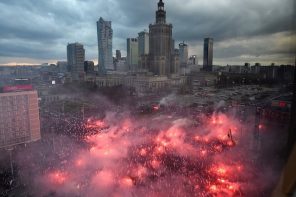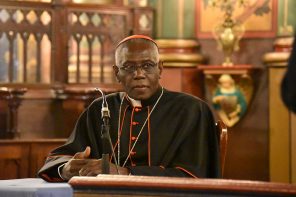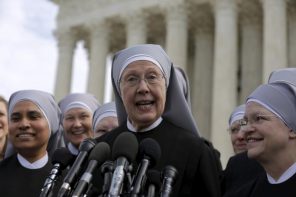In 1999 Orbis Books published Jesus Symbol of God, a book by systematic theologian Roger Haight, S.J. Before the year was out, Haight was made aware that he and his book were under investigation by the Vatican. He was told that while the inquiry was ongoing he could not teach at the Jesuit faculty where he was then teaching, nor any Catholic university. The investigation lasted more than five years, during which the Vatican sent objections to specific points in Haight’s writing, and he in turn defended his positions. There were two rounds of this and each time his responses were found unsatisfactory.
This outcome was in some ways inevitable: the Vatican insisted on a repetition of ancient theological language and Haight’s project was intended for a current intellectual context. In March 2005, he was declared not to be a Catholic theologian and forbidden to teach Catholic theology—which effectively meant he was forbidden to teach in a Catholic institution until he used the prescribed language. At that time he had been at Union Theological Seminary for a year, an ecumenical institution, but Rome maintained the pressure on Haight. The most recent measure, announced last spring, decrees that he can no longer teach anywhere or publish, though he is allowed to honor his contract at Union for academic year 2008-2009. He has also been allowed to publish in the area of spirituality, an emerging field outside of the discipline of academic theology. His Jesuit superiors have given him permission to return to Union as a Scholar in Residence, a non-teaching position.
Roger Haight does not grant interviews that directly concern his current relationship with the Roman Catholic hierarchy following his censuring. But I was able to speak with Jeremy Kirk, a student of Haight’s at Union. Under Haight’s direction, Kirk completed an in-depth analysis of Haight’s two Christological works for his Master’s thesis. Kirk, now a doctoral candidate in Christian social ethics, founded a summer reading group that focuses on Haight’s Christology, which will meet in New York City for its third consecutive year starting this May.
The following interview seeks to dig deeper into the issues surrounding the case and what it means for Catholic theology as a whole.
First of all, what briefly are the issues central to the controversy over Haight’s work?
That depends on who you ask. If you ask Pope Benedict, who as Cardinal Joseph Ratzinger played a central role in censuring Haight, he would point to several “serious doctrinal errors” in Jesus Symbol of God concerning, primarily, its lack of affirmation that Jesus is the logos, or preexistent word of God. From this base criticism, Haight is charged as having discounted the divinity and soteriological function of Jesus. But this critique minimizes and mischaracterizes Haight’s argument. Rome was really rejecting any affirmation that pluralism of religious belief, within or outside of Catholicism, is valid and therefore worthy of theological and ecclesiastical attention.
Jesus Symbol of God addressed the postmodern critiques of Christianity that are of concern to North American Catholics. Haight was affirming the continued relevance of Christianity to the contemporary philosophical and social context that has posed such challenges to the legitimacy of certain traditional Christian claims. A lack of adequate response to these challenges has resulted in many people leaving the Church. Haight saw himself as responding to reasonable critique with a reasonable response—he was doing what he was supposed to do as a priest and as a theologian.
According to Haight, was Jesus God?
Haight would reject the question. The doctrine of Jesus is: ‘God and human being,’ both ‘human and divine.’ Only Christology that is dialectical can be adequate and truly faithful to the tradition as it was articulated at Chalcedon. The doctrine holds the two together in dialectical tension, and that tension cannot be resolved—therein lies the profound mystery. For Haight, the doctrine corresponds to and articulates where the Christian finds her/himself existentially—namely in a relationship with God through Jesus and not through the Buddha, nor through Moses, nor some other symbol. Christians are those who have by faith allowed Jesus to be their access to God. This implicitly raises Jesus up to a privileged mediation of God for the Christian even though there may be others.
What would Haight say the resurrection of Jesus was?
Haight would say that resurrection can only be understood from a personal standpoint. It starts with our hopes regarding our own death and the deaths of our loved ones. The common hope is that we do not die, but continue to exist in the sphere of God. Understanding Jesus’ resurrection can only begin on the basis of hope.
Following from this, Haight would affirm that the resurrection was not an historical event that happened physically and empirically in the space-time continuum. When Christians bury a loved one, they put the body in the ground with the faith/hope that the person is resurrected in a way that does not deny the historicity of the physical burial. Haight would state that Jesus’ body did not go anywhere; it is not the resuscitation of a corpse. There was no zombie Jesus.
Haight would stress the resurrection is a difficult idea to understand because we have no sensory referent. Whenever we talk about things in this world, we have an imagination that works on our behalf. But with the resurrection, the imagination fails and actually begins to work against us. So as soon as you imagine it, you have made it something incredible, some kind of this-worldly event. You have given visual or tangible substance to it. So the point of saying it is not a historical event is to ensure that the resurrection is a transcendent reality that is a matter of faith and hope.
How did Haight respond, personally, to the initial censuring?
He was surprised. He certainly did not expect such a response from Rome. Haight has great respect for reasonable argument, and Jesus Symbol of God is a clear, reasonable argument. The Congregation for the Doctrine of the Faith (CDF—the official teaching body of the Vatican) released an official document condemning Haight’s book, but it is not a substantial criticism. The document itself would not receive a passing grade as an MDiv assignment. This and other criticisms made about the book are not usually cogent because they rest on suppositions other than those upon which the book is written—critics just don’t seem to believe that responding to postmodern critiques of Christianity is a worthy theological enterprise.
You say that Haight was surprised about the case, but certainly he must have had some idea that his Christological project did risk some punitive response from Rome. One could argue that it was not consonant with previous Christological claims made by the CDF at that time.
First of all, I would make a distinction between what Haight says in Jesus Symbol of God and how what he says can be used by other scholars. The book is an argument for how Christian faith can respond to certain, contemporary criticisms of Christian belief and tradition. It is not an argument for relativising all religious belief. Haight’s Christology is not radical outside of the context of the CDF’s dramatic response. He addresses certain critiques of Christianity (mainly concerning pluralism) as a faithful Christian theologian rooted in Christian tradition. He is a monotheist and believes there is no greater medium for experiencing the ineffable God than the person of Jesus, understood and conveyed through Christian scripture, tradition and the Church. The institutional power behind the CDF’s censures seems to obscure these facts.
But in direct response to your question, I would speculate that Haight did not think in terms of risk. He thought in terms of what he thought had to be said in light of the condition of the contemporary Church. Haight sees people leaving the Church simply because no one is answering their questions. His considerations were for these people, not risk. Plus, Orbis asked him to write the book. He was responding to what he perceived to be a need among the faithful, and his perception was echoed by a major theological publishing company that officially requested that he respond. If theologians primarily thought in terms of risk, they would be paralyzed.
Why has Haight been so quiet following his censuring? Why has he not defended himself publically?
Defending oneself in such a situation would only be taken as self-serving, which in some measure it always is. I think Haight perceives the task of his defense to be the responsibility of others. He is not a ‘renegade theologian,’ despite being inappropriately characterized as this since his censuring. Besides, what could he say that he did not already say in two volumes of Christology?
I have read that Haight was disappointed to not have the opportunity to personally address the CDF regarding their charges—an opportunity that he expected to receive. What would he have liked to do if he had been called to Rome?
I think he would have just liked to have put a face to the text. I think he wanted the CDF to see that this was a faithful human being, a Christian and a Catholic who was generating these arguments on behalf of the faithful and the institutional Church. I also wonder if Haight would not have perceived an advantage to lengthening the censuring process. At the time, everyone assumed that the installation of a new Pope would have certainly worked to the advantage of his case. Of course, we now know this would not have worked because Ratzinger, the prosecutor in the case against Haight, ended up becoming the new Pope.
How does Haight feel about the hierarchy of the Roman Catholic Church?
Well, first of all, I would say he thinks the hierarchy of the church is a good thing. Haight wants the church to have moral authority when engaging socially and politically in the world. Hierarchy is necessary for such a large institution. If you mean the current, particular occupants of positions within the hierarchy, I think he would express extreme disappointment. Haight affirms the aims of Vatican II, which stress ecumenism and affirm the importance of laity in the church. The current and last papacies are restorationist. They have clearly retrenched on these mandates of the council and are seeking to put back in place what was there before Vatican II.
But while Haight would likely express pessimism over the damage caused by the last two popes, I believe he would stress optimism concerning the laity. If you look at Roman Catholicism from the ground up, you see a new educated laity. The whole corps of theologians in the United States will be predominately lay, 80-90%, in a few more years, and 65% of that body will be women—it will be an utterly new experience for the Catholic Church. Lay people are actually running some parishes with a priest who performs a couple of specialized functions. There is a whole new dynamic energy in the Roman Catholic Church when you look at it from below.
When you look at it from above, you see signs of decline. If we consider the number of people in the seminaries, the quality of the people in the seminaries and their proclivities, it does not look promising. When you look at the episcopacy and the pool they have to draw from, it appears catastrophic. I think Haight would acknowledge such a dialectic between what particular powerful, regressive officials aim to accomplish and the unstoppable force of the laity who primarily constitute that which we term ‘the Church.’
Why does Haight remain Catholic?
It is rumored that when that question was asked of feminist theologian Ivone Gebara, she replied, “Because the women who are dying around me are Catholic.” I think for Haight, it is the same response but in a less dramatic context. He remains Catholic because he is Catholic. He assumes responsibility for the needs of those around him and draws his identity from his relationship to them. Haight wrote Jesus Symbol of God as a response to the needs of Catholics. Why would he abandon them after receiving a poorly-leveled critique?
Also, Haight values the communion of Catholics as one Church. In this way, he and Benedict are similar. They just have opposing prescriptions for how to hold this communion together. The pope is denying the existence of pluralism while Haight sees embracing pluralism (an indisputable reality) as a way of making Christianity even more effective in understanding what it means to be human at this particular time in history. Haight would encourage anyone who feels trapped by her/his Catholicism to go wherever they need to go to get fed spiritually. At the same time, for him, assuming responsibility for one’s own community is a way of finding value and identity within one’s church, which is exactly what some people are seeking in leaving Catholicism.
Finally, Jeremy, what is most at stake for you in the controversy over the work of Roger Haight?
I am 31 years old. I think my generation and subsequent generations are growing up with a more innate sense of the postmodern and historicist challenges to modern and pre-modern Christian theologies. Unlike Haight who has, from a modern standpoint sought to address the challenges of postmodern consciousness, people from my generation have to make a different choice. We either have to address a postmodern consciousness of pluralism from the start, or we have to deny what society increasingly deems as reality altogether, as fundamentalist Christianity does.
The need to recognize pluralism is not going to decrease in an increasingly globalized and interdependent world that faces increasingly complex and communal crises. If Christianity is still to serve as a resource for ethical reflection in light of historical crises (which I deeply hope it can), it must be true to this contemporary pluralistic and globalized context.
Theologians like Haight are doing the work that will keep Catholicism relevant to particular contemporary contexts, but it comes at the price of being disliked and rejected by parts of the very churches they seek to serve. A colleague at Union, Sarosh Koshy, described the Church as a ship and the theologian as one who periodically has to get out of the ship and push it off a sandbar. Sometimes in order to do this, the theologian gets left behind. Such is the case, at the moment, with Haight. But considering the impact of his work, I do not think he is lonely on that sandbar. Not with so many of us trying to join him.




